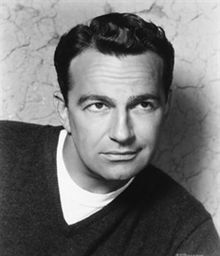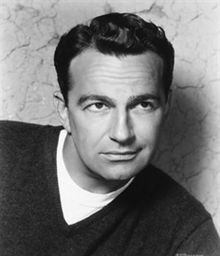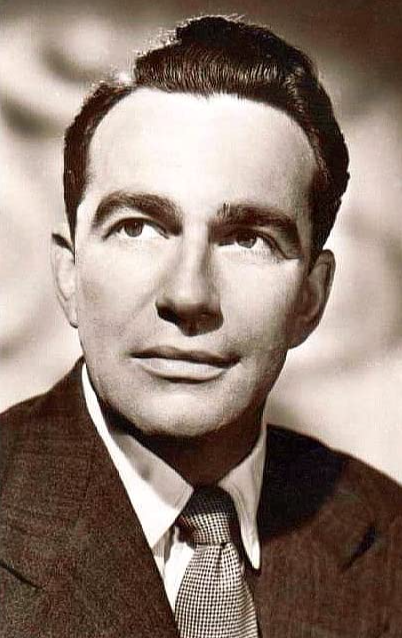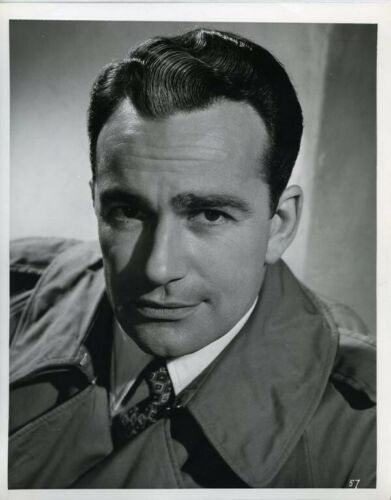The actor John Bentley, who has died aged 92, occupied a minor place in British film history through his starring roles in the black-and-white B-movie mysteries that characterised the national cinema of the late 1940s and 50s. The darkly handsome Bentley's protagonists were upright and gentlemanly, often colonial officers, reporters, or elegant amateur sleuths. He would later reach a wide audience as a regular on the popular soap opera Crossroads, from 1965 to 1977, as Hugh Mortimer, husband of Meg Richardson (played by Noele Gordon), the matriarch of the fictional Crossroads Motel.
Born in Sparkhill, Birmingham, Bentley had no initial interest in acting but, after attending a singing audition open to the public, was taken on by a BBC Midland Region producer, Martyn C Webster, and "the singing evolved into acting". Among his earliest credits was a 1936 musical comedy for Webster, One Over the 28, by Francis Durbridge, in which Bentley and Godfrey Baseley, the future creator of The Archers, were romantic leads. More radio, and repertory theatre in Perth, followed.
Bentley had an uncharacteristic West End debut in Eric Maschwitz's revue New Faces (Comedy Theatre, 1940), with Judy Campbell performing A Nightingale Sang in Berkeley Square and Charles Hawtrey camping it up in sketches. His film debut, with second billing, was The Hills of Donegal (1947), a musical romance for Butcher's, one of the many "poverty row" outfits he would work for. Again working for Durbridge, Bentley had the title role in Calling Paul Temple (1948), Paul Temple's Triumph (1950) and Paul Temple Returns (1952), which ran at the same time as the Temple radio series starring Peter Coke. The Cinema magazine opined that a Temple film without Bentley was "as unthinkable as Quo without Vadis".
Nearly all of Bentley's films, such as Hammer the Toff and Salute the Toff (both 1952), in which he was the Hon Richard Rollison, the aristocratic investigator, were made at the Nettlefold studios, in Walton-on-Thames, Surrey, and rarely took more than a week to shoot. For the Danziger brothers he appeared in, and at various times hosted, The Vise, an anthology series shown on ABC in the US, comprising crime shorts released to cinemas in Britain.
Bentley almost missed out on his last Temple film, returning to Britain just in time from location filming in Kenya for Men Against the Sun (1953). He would also film Golden Ivory and The Scarlet Spear (both 1954) and Escape in the Sun (1955) there. Then, for ITV, he was "bringing law and order to the African bush" in African Patrol (1958), a workmanlike series publicised as having been filmed entirely on location, with no stock footage (unlike its peers). As a souvenir, Bentley wore a bracelet made from elephant hair for the rest of his life.
His time in Hollywood was brief. Istanbul (1956), starring Errol Flynn, is remembered only for a nightclub scene in which Nat King Cole performs When I Fall in Love, while Submarine Seahawk (1958) was a routine naval action film. Bentley's roles in productions with larger budgets were supporting ones, such as The Happiest Days of Your Life (1950), unforgettably pairing Alastair Sim and Margaret Rutherford, and The Singer Not the Song (1961), starring Dirk Bogarde. On radio, he presented the BBC film programme Movie-Go-Round, and played the famous diarist in Meet Mr Pepys, on Capital Radio in 1974.
Having appeared as a singer on Noele Gordon's regional, daytime programmes for ATV, from February 1965 he began appearing with her (and for the same network) in Crossroads. The soap gained one of its highest audiences for the episode in 1975 when Mortimer and Richardson were married, with 18 million viewers tuning in to watch the wedding - the blessing was filmed in St Philip's cathedral, Birmingham, and the happy couple were chauffeur-driven by Larry Grayson at the wheel of a white Rolls-Royce. As a Crossroads regular, Bentley worked a seven-day week, although breaks were allowed every six weeks. He was written out by being kidnapped by terrorists, then suffering a heart attack; conveniently for the budget, his fate was communicated over the phone.
During and after his Crossroads tenure, he constantly toured in regional theatre, usually in thrillers, and more often than not teamed with fellow soap stars. Two late exceptions were Equus, at the Grand Theatre, Swansea, in 1978, in which he was the psychiatrist, Dysart, and Educating Rita at the Connaught, Worthing, in 1984.
Since the 1950s, Bentley had lived in a Georgian house in Petworth, near the Sussex Downs. He is survived by his second wife, Patricia, and a son, Roger, from an earlier marriage.
John Bentley, actor, born 2 December 1916; died 13 August 2009
The actor John Bentley, who has died aged 92, occupied a minor place in British film history through his starring roles in the black-and-white B-movie mysteries that characterised the national cinema of the late 1940s and 50s. The darkly handsome Bentley's protagonists were upright and gentlemanly, often colonial officers, reporters, or elegant amateur sleuths. He would later reach a wide audience as a regular on the popular soap opera Crossroads, from 1965 to 1977, as Hugh Mortimer, husband of Meg Richardson (played by Noele Gordon), the matriarch of the fictional Crossroads Motel.
Born in Sparkhill, Birmingham, Bentley had no initial interest in acting but, after attending a singing audition open to the public, was taken on by a BBC Midland Region producer, Martyn C Webster, and "the singing evolved into acting". Among his earliest credits was a 1936 musical comedy for Webster, One Over the 28, by Francis Durbridge, in which Bentley and Godfrey Baseley, the future creator of The Archers, were romantic leads. More radio, and repertory theatre in Perth, followed.
Bentley had an uncharacteristic West End debut in Eric Maschwitz's revue New Faces (Comedy Theatre, 1940), with Judy Campbell performing A Nightingale Sang in Berkeley Square and Charles Hawtrey camping it up in sketches. His film debut, with second billing, was The Hills of Donegal (1947), a musical romance for Butcher's, one of the many "poverty row" outfits he would work for. Again working for Durbridge, Bentley had the title role in Calling Paul Temple (1948), Paul Temple's Triumph (1950) and Paul Temple Returns (1952), which ran at the same time as the Temple radio series starring Peter Coke. The Cinema magazine opined that a Temple film without Bentley was "as unthinkable as Quo without Vadis".
Nearly all of Bentley's films, such as Hammer the Toff and Salute the Toff (both 1952), in which he was the Hon Richard Rollison, the aristocratic investigator, were made at the Nettlefold studios, in Walton-on-Thames, Surrey, and rarely took more than a week to shoot. For the Danziger brothers he appeared in, and at various times hosted, The Vise, an anthology series shown on ABC in the US, comprising crime shorts released to cinemas in Britain.
Bentley almost missed out on his last Temple film, returning to Britain just in time from location filming in Kenya for Men Against the Sun (1953). He would also film Golden Ivory and The Scarlet Spear (both 1954) and Escape in the Sun (1955) there. Then, for ITV, he was "bringing law and order to the African bush" in African Patrol (1958), a workmanlike series publicised as having been filmed entirely on location, with no stock footage (unlike its peers). As a souvenir, Bentley wore a bracelet made from elephant hair for the rest of his life.
His time in Hollywood was brief. Istanbul (1956), starring Errol Flynn, is remembered only for a nightclub scene in which Nat King Cole performs When I Fall in Love, while Submarine Seahawk (1958) was a routine naval action film. Bentley's roles in productions with larger budgets were supporting ones, such as The Happiest Days of Your Life (1950), unforgettably pairing Alastair Sim and Margaret Rutherford, and The Singer Not the Song (1961), starring Dirk Bogarde. On radio, he presented the BBC film programme Movie-Go-Round, and played the famous diarist in Meet Mr Pepys, on Capital Radio in 1974.
Having appeared as a singer on Noele Gordon's regional, daytime programmes for ATV, from February 1965 he began appearing with her (and for the same network) in Crossroads. The soap gained one of its highest audiences for the episode in 1975 when Mortimer and Richardson were married, with 18 million viewers tuning in to watch the wedding - the blessing was filmed in St Philip's cathedral, Birmingham, and the happy couple were chauffeur-driven by Larry Grayson at the wheel of a white Rolls-Royce. As a Crossroads regular, Bentley worked a seven-day week, although breaks were allowed every six weeks. He was written out by being kidnapped by terrorists, then suffering a heart attack; conveniently for the budget, his fate was communicated over the phone.
During and after his Crossroads tenure, he constantly toured in regional theatre, usually in thrillers, and more often than not teamed with fellow soap stars. Two late exceptions were Equus, at the Grand Theatre, Swansea, in 1978, in which he was the psychiatrist, Dysart, and Educating Rita at the Connaught, Worthing, in 1984.
Since the 1950s, Bentley had lived in a Georgian house in Petworth, near the Sussex Downs. He is survived by his second wife, Patricia, and a son, Roger, from an earlier marriage.
John Bentley, actor, born 2 December 1916; died 13 August 2009
Sponsored by Ancestry
Advertisement
Explore more
Sponsored by Ancestry
Advertisement




